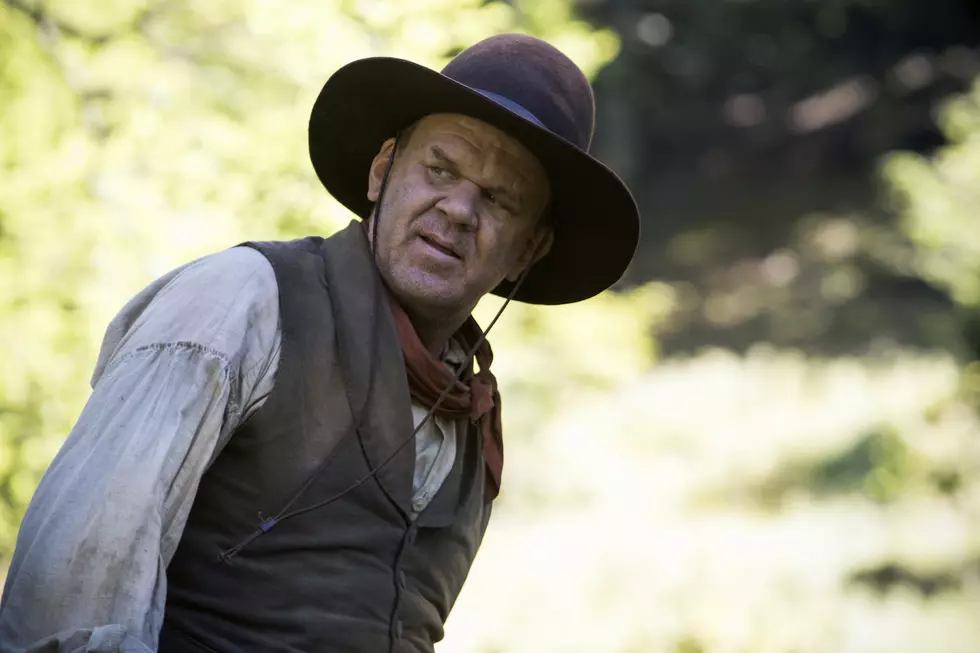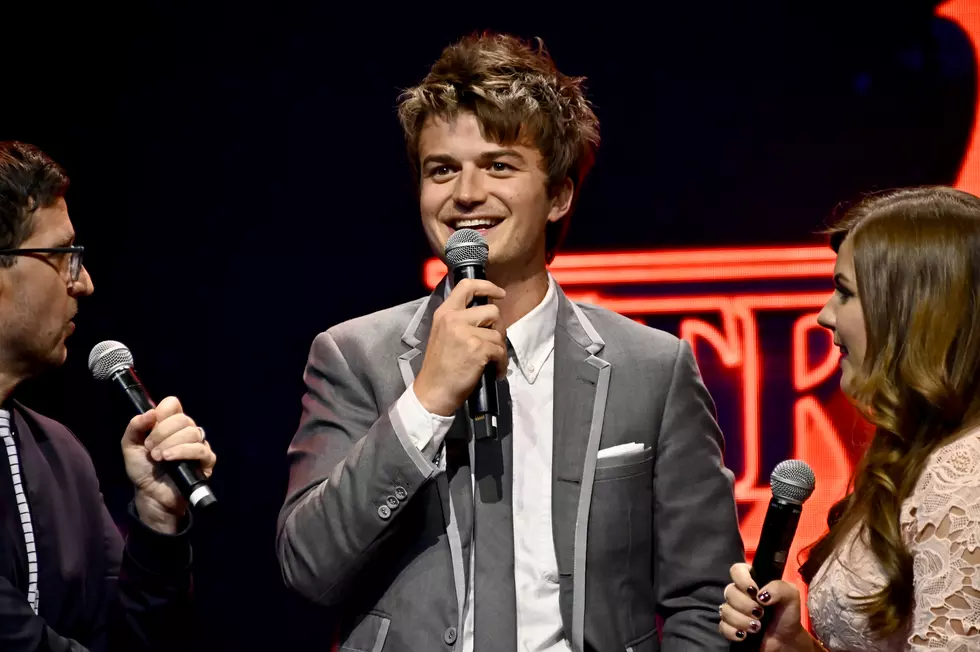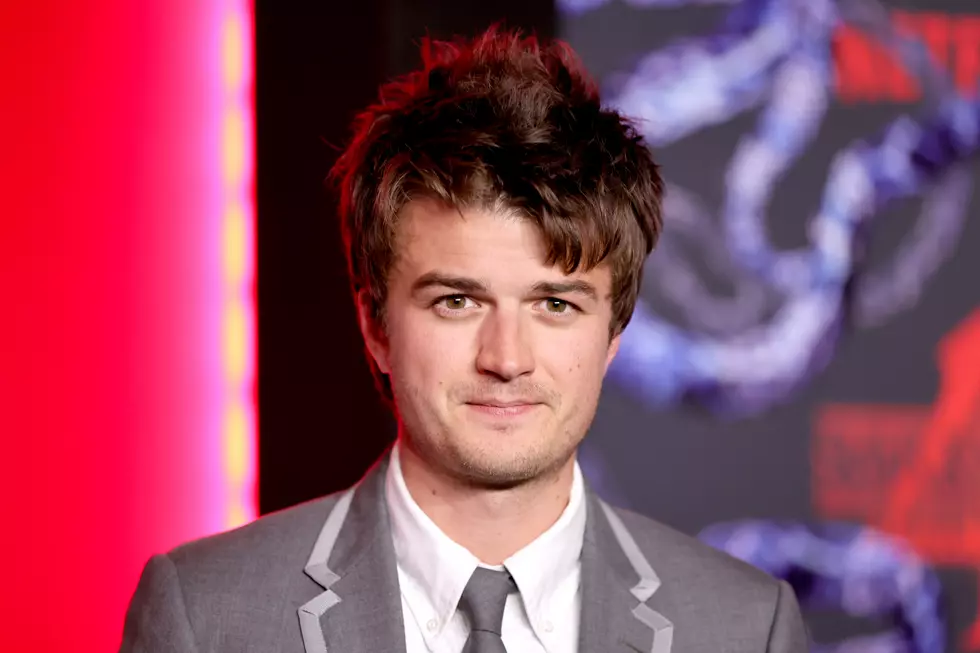
John C. Reilly on What Sets ‘The Sisters Brothers’ Apart From Classic Clint Eastwood Westerns
When you think of the typical Western, you think of savage, futile violence, emotionally aloof men, and narratives driven by a thirst for revenge and greed. Jacques Audiard’s The Sisters Brothers is none of those things. Instead, Audiard (A Prophet, Rust and Bone) uses the genre to tell a surprisingly tender and contemplative story about two assassin brothers, bound by the painful scars of their past and their impressive knack for killing.
Adapted from Patrick DeWitt’s novel of the same name, The Sisters Brothers stars John C. Reilly as Eli Sisters, the more introspective brother of the pair, and Joaquin Phoenix as the brash and always-drunk Charlie Sisters. Set in 1850s Oregon, the gunmen’s latest assignment is to find and kill a chemist named Hermann Warm (Riz Ahmed), who’s already being tracked by bounty hunter John Morris (an accented Jake Gyllenhaal). What results is a thoughtful and sensitive meditation on yearning for something greater in a society built on avarice and violence.
I caught up with Reilly last month to talk about The Sisters Brothers, a project he also produced with his wife Alison Dickey, and worked on for the past seven years. Reilly told me how the film subverts the average Western and stands out from Clint Eastwood and John Wayne classics, how its exploration of masculinity connects to today’s #MeToo movement, and proved just how gullible I am when it comes to onscreen spiders.
I read you and your wife were actually the ones who brought the book to Jacques to adapt. What made you want to see this story turned into a film?
Have you read the book?
No, I haven’t.
It’s so visual it just jumps out at you when you read it. I was doing an independent film called Terri that my wife Alison Dickey was producing, and it was directed by Azazel Jacobs and Pat DeWitt wrote the script for that movie. We made that movie and at the end of it, Alison asked Pat, “Do you have anything else you’ve written? What’re you working on?” And he says, “Oh I’ve got this thing.” It was called The Warm Job then.
After Riz Ahmed’s character?
Yeah, after Hermann Warm. The publisher made him change it. They thought The Warm Job sounded ... sexual, in some way? I’m not quite sure why, but I’m sure you can imagine. But anyway, it wasn’t a book yet, it was a manuscript. Alison read it and was blown away, she said “You have to read this right now.” And I don’t read fiction books very often. I have to read so many scripts that I’m kind of just over fiction, I’d rather just learn about something real than somebody’s version of it. So I was like [heavy sigh], “Are you kidding me?” “No you have to read it. There’s a part in here that’s so good for you.” Alright. I start reading it and I could not stop. I read all that day, I slept for a little while, I got up and continued reading and finished it in 24 hours. And that’s saying something for someone who’s reluctant of a reader as me.
It was was such a page-turner. The story is so compelling, this is such an original take on the Western, this is such an interesting look at masculinity, it’s such an interesting look at brothers and the dynamics of families and fathers, and what do we get from our fathers, what do we need from our mothers. It was so rich, and Patrick really turned the genre on its head, and it was just thrilling to read it. That began the process. We approached and said we’d like to buy the rights, and that was seven years ago, or more. We set about trying to find somebody. Which probably takes me to your next question.
Yeah, what led you to Jacques?
Rather than looking for a director for hire, we wanted someone who was going to make it a personal film. Who was going to take this source material – and I had written a rough draft, just the plot of the story in a script form, with Pat – make it their own and make it about their own experience. All of the films that my wife and I really love all felt like that. [In Boogie Nights] Paul [Thomas] Anderson, the story was saying something about the porn industry in the San Fernando Valley, but Paul had a very personal take on that movie. He was saying a lot of personal stuff through that movie, and we realized well, that’s what we need. We don’t need a talented technician that we hire to execute the movie we know we already want, or to do this book exactly as it’s written. We want someone who’s going to take this material and synthesize it through their own lens of their experience, and then make a brilliant film out of it.
Jacques was very high on our list right away, and Alison was a huge fan of his and was advocating for him from the beginning. But it was a little bit of a pie in the sky kind of thing; he’s one of the most talented director’s in the world, first of all, he’s in Europe, we didn’t even know if he spoke English – he does – at the time, but we heard that he’s going to Toronto. So we went to Toronto and we got him to have lunch with us. […] We said, “Here we have this thing. See if you like it and if you want to take it on as your own.” And I honestly think, I can’t blame him, I think he was like, “Why are you doing this?” When someone’s like, “Here have this!” He’s like, “Why are you giving this to me?”
In the sense of, “Why me?” Was he wondering why you wanted him specifically for it?
Just why anyone would own a property and say, “You can do whatever you want with it.” It’s somewhat counterintuitive – you buy the rights then you want to control it. Most producers are like that. But we explained to him, “We want to make a different kind of movie, we want this to be a personal film for you.” So anyway, it took a lot of bridging the gaps between France and America, and many drafts of the scripts that Jacques did with his writing partner, and then the casting process. It was a lot of collaboration and cooperation between all these countries. It was shot in Spain, Romania, and France, that was a whole other thing. 70 percent of the crew was Spanish for a while, then 70 percent was Romanian; so it was constantly bridging these different worlds and languages.
It’s funny, because that’s really what the American West was like at this time. It was like the virtual Tower of Babel. There were immigrants from all over the world in the West looking for gold, and trying to make their way in America. So Jacques was a good choice for that reason, and he immediately embraced that, this idea of the American West as a melting pot. We like to think it’s all white guys in cowboy hats, or the common cliche of the western is that, but in fact there were people from all over the world. […]
We were also looking for someone who could avoid that cultural baggage that we have. I think a lot of Americans’ point of view about the West and cowboys and that whole genre is based on other movies, you know? We knew if we got a European director to do this, they would bring with it a more objective observation of the reality of the time, and we could avoid some of the cliches of the Western, because the book does.
I think one of the chief strengths of the book, and what makes it so original, is unlike say Clint Eastwood – who I love and those films of course are brilliant and legendary for a reason – but when you watch a Clint Eastwood film it’s just opaque. You can’t tell what he’s feeling, what he’s thinking. You’re trying to decipher what he’s doing by his actions, and he’s silent most of the time. In this book, these people are doing the same kinds of things Clint Eastwood does in his movies, [but] you get this rich emotional life. The book is told through the mind’s eye of Eli, my character; he’s talking about his self-esteem issues, “I wish I wasn’t so fat,” “I don’t know if I can keep doing this, killing people.” It’s a really interesting psychological study, and even though it’s set in this Western genre, we wanted the film to feel like a fresh take. Because otherwise, what’s the point?
Right, we’ve seen so many similar Westerns before.
Right, and you can go back and watch Clint Eastwood and John Wayne, they’re great. But Jacques, one of his primary concerns early on was, “Why should we tell this story now? Why does the world need this?” He sort of came around to those ideas himself. I can’t speak for him, but when I watch the film – we didn’t have any conversations about the overall themes of the movie; all of my interactions with Jacques were about my character and my relationship with Joaquin – but when I watch the movie I see a really timely story.
A, it’s how we made it. So at a time of complete divisiveness between countries and an us-against-them mentality, we made a movie that involved French people, Spanish people, Romanian people, American people, English people, and we brought them all together and figured out a way to create something beautiful. That alone to me is a big accomplishment. But I also think the movie looks at gender and masculinity, even though there’s not so many female characters in the movie, it looks at that. The two things I think are most timely about the film are – I’m sorry if I’m answering questions you didn’t ask.
That’s alright. I’m curious what you think.
One is about men. I think because of this #MeToo moment and we’re looking at gender and what it means to be a man, what it means to be a woman, what it means to be identified by birth and what it means to be identified through your own lens and the way you’re seeing the world and the way you feel. Rebecca [Root], who played Mayfield in the film. She’s a trans actress. I love that we don’t say exactly what her story is, we just meet her and we’re expected to just accept her. And she’s just wonderful in the movie, she has a beautiful performance.
Anyway, so about the men thing – there’s four different stages of masculinity [in the movie], of how men are seeing themselves in the world. Starting with this idea of Charlie, who’s stuck in this brutal, violent law-of-the-gun mentality; history is littered with people like that. Then you have me, Eli, who is inextricably linked to that person, so he’s tied to that world, but he sees another way to go. He’s trying to suggest to Charlie, “We don’t have to keep being this way, we can maybe be that way.”
Eli is the one looking for a way out of the brothers’ violent lifestyle.
Yeah, or another way to be. Another way to see the world, in a more grey way as opposed to black and white. Then you have Jake’s character Morris, who has seen that other way and has decided, “I’m gonna try to go towards it.” And then you have Hermann Warm, who is like, “I’ve seen the promised land and it’s there. Come follow me.” He’s on the leading edge of it. I mean, the feminist women I’ve spoke to about the film, including Megan Ellison and a lot of the people at her company Annapurna, who are releasing the film, they really respond to that. The sensitivity that we show as men, and a lot of the issues that we’re dealing with, they’re like, “We’re showing a different kind of man in this movie.” Which I was very gratified to hear.
The other thing I think is going on is […] in the 1850s, cartridge bullets were invented, which means anyone could [makes fast gunfire sounds], never stop shooting. So with that – and this is just my theory – at that moment in the world, we’d just settled the West through murder, appropriation, genocide, complete lawlessness, and violence was the rule of the day. In the 1850s people were starting to make settlements, and I think people were like, “Wait a second, this is not a sustainable way to move forward. I don’t want to provide my own security 24 hours a day. We should have law. That is how a civilized society should work.” And so there was this sea change in mentality, and I think we’re at a similar place [today]. We’re looking at a time when we’ve realized the way we’ve been behaving is no longer sustainable, we have to find another way, a way that’s based more on kindness and sharing, like Warm says in the movie. Because simply, our survival depends on it. We’re just going to extinguish ourselves if we continue the way we’re going.
I know we don’t have much time, but I wanted to ask you about the spider scene. You didn’t actually have a real spider on your face did you?
Yeah! It’s amazing it wasn’t a venomous spider, but I had to hold perfectly still while it crawled into my mouth.
Wait, it actually crawled in your mouth?
Oh yeah. It crawled and I closed my mouth.
[Covers mouth in horror]
I’m kidding, it’s CGI. [Laughs]
Oh my god. I mean, I did watch the scene through my fingers…
But isn’t that amazing? That’s how good CGI is now. It’s so real, it freaks me out when I see it. I know it’s totally fake, but still.
Real quick, I have to ask you about Step Brothers 2…
This is everyone’s last question today. Literally every single person! There’s no Step Brothers 2. It’s not on the table. I would love to do it, we’ve talked about it, we have some great ideas for the sequel, but it’s not everyone’s first move to want to do a sequel. Most people like Will and Adam and I, we’re trying to do new stuff. We’re trying to find the next Step Brothers.
That said, I really appreciate all the love people have for that movie. And I think we pulled it off in a way that we were all really proud of. I would definitely consider it, but you know, Adam has gone off and started to do really interesting dramatic things. I’m not sure what’s gonna happen, but it’s literally the million dollar question today.
The Sisters Brothers opens in limited release on September 21.
More From B105










